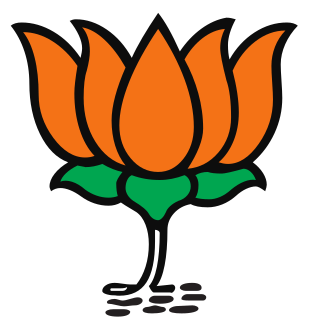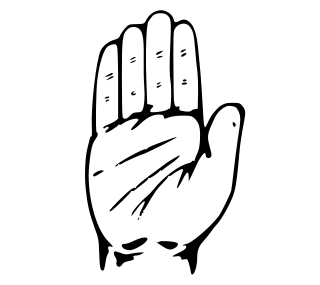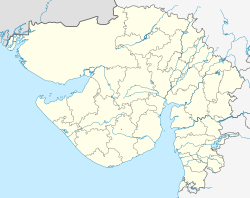
India, officially the Republic of India, is a country in South Asia. It is the second-most populous country, the seventh-largest country by land area, and the most populous democracy in the world. Bounded by the Indian Ocean on the south, the Arabian Sea on the southwest, and the Bay of Bengal on the southeast, it shares land borders with Pakistan to the west; China, Nepal, and Bhutan to the north; and Bangladesh and Myanmar to the east. In the Indian Ocean, India is in the vicinity of Sri Lanka and the Maldives; its Andaman and Nicobar Islands share a maritime border with Thailand and Indonesia.

India is the second most populated country in the world with nearly a fifth of the world's population. According to the 2019 revision of the World Population Prospects the population stood at 1,352,642,280.

Mumbai is the capital city of the Indian state of Maharashtra. According to the United Nations, as of 2018, Mumbai is the second-most populous city in the country after Delhi and the seventh-most populous city in the world with a population of roughly 20 million. As per Indian government population census of 2011, Mumbai was the most populous city in India with an estimated city proper population of 12.5 million living under Municipal Corporation of Greater Mumbai. Mumbai is the centre of the Mumbai Metropolitan Region, the sixth most populous metropolitan area in the world with a population of over 23 million. Mumbai lies on the Konkan coast on the west coast of India and has a deep natural harbour. In 2008, Mumbai was named an alpha world city. It has the highest number of millionaires and billionaires among all cities in India. Mumbai is home to three UNESCO World Heritage Sites: the Elephanta Caves, Chhatrapati Shivaji Maharaj Terminus, and the city's distinctive ensemble of Victorian and Art Deco buildings.

Mohandas Karamchand Gandhi was an Indian lawyer, anti-colonial nationalist, and political ethicist, who employed nonviolent resistance to lead the successful campaign for India's independence from British rule, and in turn inspired movements for civil rights and freedom across the world. The honorific Mahātmā, first applied to him in 1914 in South Africa, is now used throughout the world.

Maharashtra is a state in the western peninsular region of India occupying a substantial portion of the Deccan Plateau. Maharashtra is the second-most populous state in India as well as the second-most populous country subdivision in the world. It was formed on 1 May 1960 by splitting the bilingual Bombay State, which had existed since 1956, into majority Marathi-speaking Maharashtra and Gujarati-speaking Gujarat. The state capital is Mumbai, the most populous urban area in India. The Godavari and the Krishna are the two major rivers in the state. Marathi is the most widely spoken language and is also the official language of the state.

The East India Company (EIC), also known as the Honourable East India Company (HEIC), East India Trading Company (EITC), the English East India Company or the British East India Company, and informally known as John Company, Company Bahadur, or simply The Company was an English and later British joint-stock company founded in 1600. It was formed to trade in the Indian Ocean region, initially with the East Indies, and later with Qing China. The company seized control of large parts of the Indian subcontinent, colonised parts of Southeast Asia and Hong Kong after the First Opium War, and maintained trading posts and colonies in the Persian Gulf Residencies.

The Bharatiya Janata Party is one of two major political parties in India, along with the Indian National Congress. It is the current ruling political party of the Republic of India, having been so since 2014. The BJP is a right-wing party, and its policy has historically reflected Hindu nationalist positions. It has close ideological and organisational links to the much older Rashtriya Swayamsevak Sangh (RSS). As of 2019, it is the country's largest political party in terms of representation in the national parliament and state assemblies and is by far the world's largest party in terms of primary membership, with the second largest party, the Chinese Communist Party, having about half the registered members of the BJP.

The Indian National Congress, is a political party in India with widespread roots. Founded in 1885, it was the first modern nationalist movement to emerge in the British Empire in Asia and Africa. From the late 19th century, and especially after 1920, under the leadership of Mahatma Gandhi, Congress became the principal leader of the Indian independence movement. Congress led India to independence from the United Kingdom, and powerfully influenced other anti-colonial nationalist movements in the British Empire.

Bhimrao Ramji Ambedkar, also known as Babasaheb Ambedkar, was an Indian jurist, economist, politician and social reformer, who inspired the Dalit Buddhist movement and campaigned against social discrimination towards the untouchables (Dalits). He was British India's Minister of Labour in Viceroy's Executive Council, a member of the Constituent Drafting committee, independent India's first Minister of Law and Justice, and considered the chief architect of the Constitution of India.

Allahrakha Rahman, known professionally as A. R. Rahman, is an Indian film composer, record producer, singer, and songwriter who works predominantly in Tamil and Hindi films. In 2010, the Indian government awarded him the Padma Bhushan, the nation's third-highest civilian award. Among Rahman's awards are six National Film Awards, two Academy Awards, two Grammy Awards, a BAFTA Award, a Golden Globe Award, fifteen Filmfare Awards and seventeen Filmfare Awards South.

Uttar Pradesh is a state in northern India. With roughly 200 million inhabitants, it is the most populous state in India as well as the most populous country subdivision in the world. It was created on 1 April 1937 as the United Provinces of Agra and Oudh during British rule, and was renamed Uttar Pradesh in 1950, giving it the acronym UP. The state is divided into 18 divisions and 75 districts, with the capital being Lucknow and financial & industrial capital being Kanpur. On 9 November 2000, a new state, Uttaranchal, was carved from the state's Himalayan hill region. The two major rivers of the state, the Ganges and Yamuna, join at Triveni Sangam in Allahabad and flow further east as Ganges. Other prominent rivers are Gomti and Saryu. The forest cover in the state is 6.09% of the state's geographical area.

India is a federal union comprising 28 states and 8 union territories, for a total of 36 entities. The states and union territories are further subdivided into districts and smaller administrative divisions.

Narendra Damodardas Modi is an Indian politician serving as the 14th and current Prime Minister of India since 2014. He was the Chief Minister of Gujarat from 2001 to 2014 and is the Member of Parliament for Varanasi. Modi is a member of the Bharatiya Janata Party (BJP) and its National Democratic Alliance (NDA). He is also a member of the Rashtriya Swayamsevak Sangh (RSS), a Hindu nationalist volunteer organisation. He is the first prime minister born after India's independence, the second non-Congress one to win two consecutive terms after Atal Bihari Vajpayee and the first from outside the Congress to win both terms with a majority in the Lok Sabha.

A Naxal or Naxalite is a member of militant political organisation that claims the legacy of the Communist Party of India (Marxist–Leninist), founded in Calcutta in 1969.

The economy of India is characterised as a middle income developing market economy. It is the world's sixth-largest economy by nominal GDP and the third-largest by purchasing power parity (PPP). According to the International Monetary Fund (IMF), on a per capita income basis, India ranked 142nd by GDP (nominal) and 124th by GDP (PPP) in 2020. From independence in 1947 until 1991, successive governments promoted protectionist economic policies with extensive state intervention and economic regulation, which is characterised as dirigism, in the form of the License Raj. The end of the Cold War and an acute balance of payments crisis in 1991 led to the adoption of a broad economic liberalisation in India. Since the start of the 21st century, annual average GDP growth has been 6% to 7%, and from 2014 to 2018, India was the world's fastest growing major economy, surpassing China. Historically, India was the largest economy in the world for most of the two millennia from the 1st until the 19th century.

Mahendra Singh Dhoni, is a former Indian international cricketer who captained the Indian national team in limited-overs formats from 2007 to 2017 and in Test cricket from 2008 to 2014. Under his captaincy, India won the inaugural 2007 ICC World Twenty20, the 2010 and 2016 Asia Cups, the 2011 ICC Cricket World Cup and the 2013 ICC Champions Trophy. A right-handed middle-order batsman and wicket-keeper, Dhoni is one of the highest run scorers in One Day Internationals (ODIs) with more than 10,000 runs scored and is considered an effective "finisher" in limited-overs formats. He is widely regarded as one of the greatest wicket-keeper batsmen and captains in the history of the game. He was also the first wicket-keeper to effect 100 stumpings in ODI cricket.

The British Raj was the rule by the British Crown on the Indian subcontinent from 1858 to 1947. The rule is also called Crown rule in India, or direct rule in India. The region under British control was commonly called India in contemporaneous usage, and included areas directly administered by the United Kingdom, which were collectively called British India, and areas ruled by indigenous rulers, but under British tutelage or paramountcy, called the princely states. The region was sometimes called the Indian Empire, though not officially.

Virat Kohli is an Indian cricketer and the current captain of the India national team. A right-handed top-order batsman, Kohli is regarded as one of the best contemporary batsmen in the world. He plays for Delhi in domestic cricket and for Royal Challengers Bangalore in the Indian Premier League (IPL) as captain of the franchise since 2013.

The Mughal Empire, Mogul or Moghul Empire, was an early modern empire in South Asia. For some two centuries, the empire stretched from the outer fringes of the Indus basin in the west, northern Afghanistan in the northwest, and Kashmir in the north, to the highlands of present-day Assam and Bangladesh in the east, and the uplands of the Deccan plateau in south India.





















